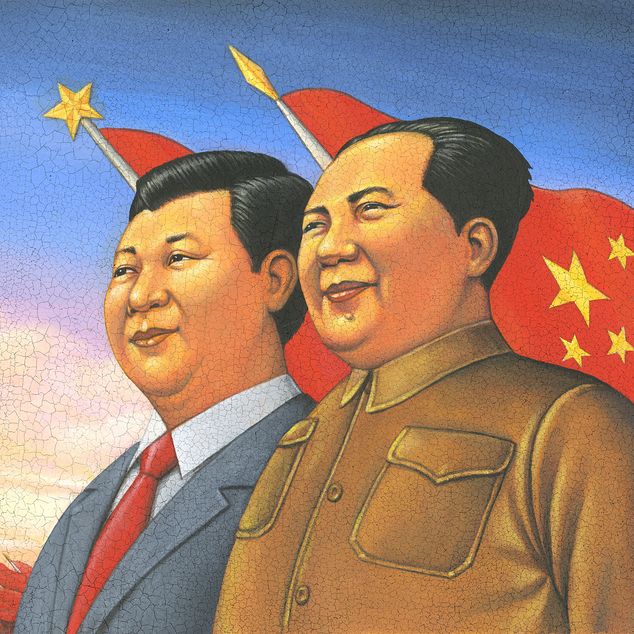Dynastic cycle and shadows of the past over Xi’s China
Like Mao Zedong, Xi Jinping worries that his party could lose power through a combination of corruption, complacency, decay and crises. Both are well aware of the concept of the dynastic cycle, which posits that in China’s history no dynasty has been able to escape the vicious cycle of the rise and fall of political power. In a bid to escape this cycle, Mao sought absolute power and the transformation of China into a communist paradise. The tragedy of high Maoism that ensued should serve as a cautionary tale today for the Party under Xi as it tightens control over Chinese society.
The dynastic cycle problem
In July 1945, during a visit to the wartime communist base area at Yan’an, educator and progressive political activist Huang Yanpei (黃炎培) had a conversation with Mao about a topic that has preoccupied Chinese emperors and thinkers for thousands of years: the dynastic cycle (周期律). For many of them, the rise and fall of dynasties must have seemed as immutable as the change of seasons, filled with both tragic destructiveness and transformative potential. In Huang’s words:
Having lived for more than 60 years, I have seen many instances of ‘rapid rise, and rapid fall’. An individual, a family, a group, a place, even a country do not have the power to escape from this cycle of history. For every period of history, there is ‘indifference and slacking’, ‘the end of political power from the death of the leader’, and ‘seeking glory but finding shame’. Overall, none can jump out of that cycle of history. As I understand, the Chinese communists, from the past until now, have been trying to find a new path to escape the power of this cycle.
我生六十多年,耳闻的不说,所亲眼看到的,真所谓‘其兴也勃焉’,‘其亡也忽焉’,一人,一家,一团体,一地方,乃至一国…都没有跳出这周期率的支配力。… 一部历史‘政怠宦成’的也有,‘人亡政息’的也有,‘求荣取辱’的也有。总之没有能跳出这周期率。中共诸君从过去到现在,我略略了解。就是希望找出一条新路,来跳出这周期率的支配。
Mao replied confidently, declaring to Huang:
We have already found a new path; we can escape from this cycle. This new path is democracy. The only way for the government to not slack off is for the people to oversee the government. If everyone starts to be responsible, then the ‘end of political power from the death of the leader’ can be avoided.
我们已经找到了新路,我们能跳出这周期律,这条新路,就是民主。只有让人民来监督政府,政府才不敢松懈;只有人人起来负责,才不会‘人亡政息’。
Not only did Mao and his comrades not institute democracy, as they had repeatedly promised before the Chinese Communist Party (CCP) defeated the nationalists and seized political power. Instead, the CCP became increasingly illiberal and politically intolerant, prosecuting successive campaigns in the 1950s and 1960s that destroyed millions of lives.
Heralds of History (历史的先声), edited by Xiao Shu (笑蜀), is a book that documents articles and speeches by party leaders and organisations from the 1940s that outline the Party’s core goals for China: freedom, democracy, constitutionalism. The book was banned shortly after its publication in the People’s Republic in 1999.

Picture courtesy of Wall Street Journal (via Google)
Mao and Xi
Despite the dissonance between ideals and rhetoric on the one hand, and practice on the other, the Huang-Mao dialogue has been much celebrated by the CCP, especially in recent years. Xi Jinping has repeatedly used this dialogue as a warning to party cadres against complacency.
In January 2018, Xi addressed the topic of dynastic cycle and political power at some length in a speech on party-building. After discussing select historical episodes, he concluded that the common denominator that led to the fall of past Chinese regimes is internal erosion, especially from corruption and division. For Xi, the primary means of keeping the Party from succumbing to the vicious cycle of the birth and decay of political power is “self revolution” (自我革命), that is, renewing the life-blood of the Party through self-imposed, and sometimes painful, changes that strengthen its organisational and ideological cohesion.
Like Mao, Xi recognises the challenges posed by the dynastic cycle. But unlike Mao, Xi does not seem to believe that this challenge could be dealt with once and for all, but rather that the Party will always need to be in fighting mode to retain its preeminence in the political order.
Mao and Xi shared the same goal, which is to keep CCP in power. But their methods differ. Mao, having promised democracy and not delivered, tried to end Chinese history by transforming it into a communist nirvana through revolutionary upheaval. The misguided experiment of the Great Leap Forward and the Cultural Revolution were the most prominent and tragic examples of ideological excess.
Xi, fortunately, has no such grand ambitions. At least, not yet. Instead, he has repeatedly argued that constant vigilance and adaptation is the only way to keep the Party from being swept away into history’s dustbin. In a warning to party cadres, Xi said in July 2019:
Our party is the world’s largest party. There is no external force that can defeat us; only we can defeat ourselves.
我们党作为世界第一大党,没有什么外力能够打倒我们,能够打倒我们的只有我们自己。
Party leads all
The imperatives of regime security have prompted the CCP under Xi to declare, in the strongest language, the supremacy of the Party as the most fundamental and indisputable feature of China’s political system, an inevitability born out of history. Xi’s emphasis on the need for party supremacy across the full spectrum of political, economic and social activities highlights a heightened level of vigilance and insecurity.
The Party’s flagship journal Qiushi recently dedicated an entire issue to this declaration of supremacy. In the issue’s lead article, ‘CCP’s leadership is the most fundamental distinguishing feature of Socialism with Chinese Characteristics’ 中国共产党领导是中国特色社会主义最本质的特征, Xi declares:
Party, government, military, society, education, east, west, south, north, centre, the Party leads all.
党政军民学,东西南北中,党是领导一切的。
The idea of the Party’s monopoly of power is nothing new, of course. But rising rhetoric of this kind coupled with recent developments, including the CCP’s actions in Hong Kong and Xinjiang, points China in a worrying direction. The lofty promises, broken dreams and tragedies of high Maoism should serve as a cautionary tale for a Party bent on further tightening its grip over Chinese society.
This article was first published on China Story on August 14, 2020.
